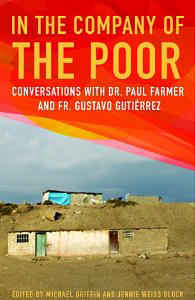Book Notes
 Michael Griffin and Jennie Weiss Block, eds., In the Company of the Poor; Conversations with Dr. Paul Farmer and Fr. Gustavo Gutiérrez (Maryknoll: Orbis Books, 2013), 206pp.
Michael Griffin and Jennie Weiss Block, eds., In the Company of the Poor; Conversations with Dr. Paul Farmer and Fr. Gustavo Gutiérrez (Maryknoll: Orbis Books, 2013), 206pp.
By Dan Clendenin
This book brings together two important voices on "the insomnia of the scandal of poverty." Farmer (b. 1959) is a Harvard MD and PhD (anthropology), clinician, tuberculosis specialist, author of numerous books and scholarly articles, recipient of a MacArthur "genius" grant, and, today, Professor of Medical Anthropology at Harvard Medical School — when he is not living in a hut in his beloved Haiti where he founded Partners in Health, or traveling a quarter million miles a year to lecture, visit prisons, or meet with George Soros or the Gates Foundation. Most important of all, Farmer is an unapologetic, outspoken, and radical advocate for the poorest of the poor. Adequate health care, he insists, is a basic human right for every human being.
Father Gutiérrez (b. 1928) is a Dominican priest and theologian who now splits his time between his parish in Lima, Peru, where for fifty years he has lived and worked among the poor, and teaching at Notre Dame University. In 1971 he published a game-changer of a book called A Theology of Liberation, which established his reputation as the "father of liberation theology" and made famous the notion of a "preferential option for the poor." Farmer read Gutiérrez as a student. When he founded Partners in Health in 1987, he took his legal mission statement for incorporation directly from Gutiérrez: "Our mission is to provide a preferential option for the poor in heath care."
Both men categorically reject the many "explanations" for why so many people of the world are so poor. It's not nobody's fault, just the way things are, our socialization, or accidental forces of history. The deplorable disparities between rich and poor are not random occurrences, they are not accidental, inescapable or necessary. Rather, they result from pathologies of power, human agency, and structural violence. People are poor because of the choices other people have made. And as Farmer likes to point out, disease makes its own preferential option for the poor that leads to early death. Thus the mainstream pushes the poor to the margins of historical invisibility and moral indifference.
The book is awkward because it's a patchwork put together around a 2011 conference at Notre Dame. The first two chapters are versions of papers that each author presented at the conference. Chapters 3 and 4 are chapters reprinted from their respective books — Farmer's Pathologies of Power (2003) and We Drink From Our Own Wells (1984) by Gutiérrez. Chapter 5 is a 2013 reflection by Farmer on a re-reading of Gutiérrez after first encountering him 20 years ago. Chapter 6 is a journal article by Gutiérrez from 2009. The final chapter is an interview of both men from the 2011 conference at Notre Dame. Nonetheless, as you would expect, in this book these two prophets call us to conversion — to personal solidarity with the poor, to "leave the road we're on and enter the world of an other."


